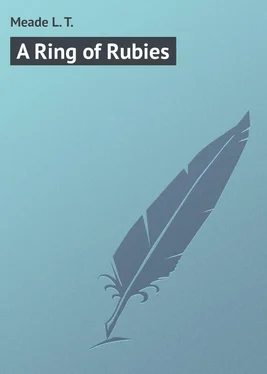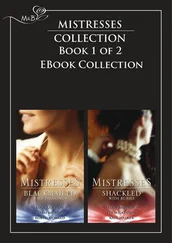L. Meade - A Ring of Rubies
Здесь есть возможность читать онлайн «L. Meade - A Ring of Rubies» — ознакомительный отрывок электронной книги совершенно бесплатно, а после прочтения отрывка купить полную версию. В некоторых случаях можно слушать аудио, скачать через торрент в формате fb2 и присутствует краткое содержание. Жанр: foreign_prose, foreign_children, на английском языке. Описание произведения, (предисловие) а так же отзывы посетителей доступны на портале библиотеки ЛибКат.
- Название:A Ring of Rubies
- Автор:
- Жанр:
- Год:неизвестен
- ISBN:нет данных
- Рейтинг книги:3 / 5. Голосов: 1
-
Избранное:Добавить в избранное
- Отзывы:
-
Ваша оценка:
- 60
- 1
- 2
- 3
- 4
- 5
A Ring of Rubies: краткое содержание, описание и аннотация
Предлагаем к чтению аннотацию, описание, краткое содержание или предисловие (зависит от того, что написал сам автор книги «A Ring of Rubies»). Если вы не нашли необходимую информацию о книге — напишите в комментариях, мы постараемся отыскать её.
A Ring of Rubies — читать онлайн ознакомительный отрывок
Ниже представлен текст книги, разбитый по страницам. Система сохранения места последней прочитанной страницы, позволяет с удобством читать онлайн бесплатно книгу «A Ring of Rubies», без необходимости каждый раз заново искать на чём Вы остановились. Поставьте закладку, и сможете в любой момент перейти на страницу, на которой закончили чтение.
Интервал:
Закладка:
Meade L. T.
A Ring of Rubies
Chapter One
Storming the Citadel
I have often been asked to tell the story of the Ruby Ring, and I now do so for the sake of my children. It may instruct them a little; it will certainly amuse and interest them.
I am nearly thirty now, but when the story of the ring happened, I was between nineteen and twenty. It is not so long ago, therefore, and all the events stand out quite clear and strong in my memory.
We lived in the country, about thirty miles away from London. There were plenty of quick trains, even ten years ago, and my father and brothers used to go to town every morning, and return in time for a sort of mixed meal between dinner and supper, at night.
My mother and I had rather a dull life; the only event of any moment in the twenty-four hours being the evening meal when the men of the family were at home.
I was the only girl, and the youngest of the family. I was not petted nor made much of in any way; ten years ago girls were not fussed over as they are now. My father had none of the advanced ideas with regard to women; he thought the less girls were heard of outside their homes, the better. He was a very good, honourable man, but a great autocrat. What he said and thought was echoed both by my mother and brothers. They all preached to me from morning till night the doctrine of staying quietly at home, of doing nothing, and of waiting until your fortune dropped into your lap.
Of course, we were horribly poor; not in the exciting sort of way of wanting food, and a covering for our heads, or anything dramatic of that sort; but poor in the way which takes the courage out of a young life more than anything else – a penny had always to be looked at twice, a dress had always to be turned twice, meals had to be scanty, fires small, and my mother’s whole time was spent contriving and planning how to make two ends meet, consequently life was very narrow and dull.
One day, on a certain sunshiny morning, a few months after I was nineteen, I awoke early, lay for an hour thinking hard, then jumped up and dressed myself. As I arranged my thick hair before the glass, I looked attentively at my face. I had a rather square face; the lower part of it in particular was somewhat heavily moulded; my mouth had very firm lines; my eyes were dark and deeply set. Certainly I was not beautiful, but my face had lots of character; I could see that for myself.
“The present state of things cannot go on any longer,” I mentally soliloquised. “I’ll make a break in the dulness this very day. The fact of my being born a woman shall not shut me out from all joy in life; I’ll have the whole subject out with mother after breakfast.”
“Rosamund,” said my mother that morning, when my father and the boys had gone to London, “will you put on your hat, and come with me into the orchard to pick the late damsons? I want to preserve them this afternoon.”
“Oh, wait until to-morrow, mother. I have something important to talk about; the damsons can keep.”
My mother was very gentle. Now she raised her brows a little, and looked at me anxiously.
“It seems a pity to waste the time,” she said. “I know what you are going to say, and I can’t grant it. I spoke to your father last night. He says he cannot raise your quarter’s allowance, so the new trimmings must be dispensed with, poor Rose.”
These were for my winter dress. I was turning it, and mother and I had planned how some new velvet would improve it.
“My dear mother,” I said, going over to her, “yesterday I should have been fretted about a trifle like this, but to-day it does not even seem like a pin-prick. I made a resolve this morning, mother, and I want to talk it out with you now.”
Every one in the house knew that my resolves were not to be trifled with. I did not often make them, but when I did, I metaphorically put down my foot, and kept it down. Even my father listened good-humouredly when I had one of my great determinations on.
Now my mother gently sighed, gave up the damson jam on the spot, and began to unroll her knitting.
“Be as quick as you can, Rosamund,” she said, in a rather weary voice.
“I can say what I want to say in a very few words, mother, only please don’t interrupt me. I am tired of my present life. I want to do something. I want to go to town every morning, and come back at night.”
My mother held up her hands.
“I want to earn money.”
A look of agony came into my mother’s gentle blue eyes. I turned slightly away.
“I have one talent, and I wish to cultivate it.” Here my mother would interrupt.
“You have many gifts, my dear child,” she said proudly. “In particular you have a great faculty for turning and contriving. Most invaluable under our circumstances.”
“I hate turning and contriving,” I burst out, “and I have only got one real talent, and that is, for art. I could be an artist.”
“You are an artist, Rosamund; you paint beautifully.”
“Dreadfully, you mean, mother. I have no knowledge of perspective. I have no true ideas of colour; but I could paint.”
I felt sparkles of hope coming into my eyes, and I knew my cheeks were flaming.
My mother glanced up at me admiringly. “You look quite handsome, dear,” she said. “Oh, if I could dress you properly! Rose, when I was your age I had nice clothes.”
“Never mind that, mother dear; I shall have money to buy nice clothes presently. I want to cultivate what I feel is within me, I want to cultivate the love which ought to become a power. I love pictures; I love dabbling with paints; my brush ought to be able to tell stories, and it shall when once I have mastered the technical difficulties. I want to go to a school of art in London, to begin at the beginning, and work my way up. I should like best to go to the Slade School.”
My mother opened her lips to speak. I interrupted her.
“I know what you are going to say. There is no money. I have thought that part out very carefully. Mother, you must consent! Just for a little bit of pride my whole life must not be spoiled. Mother dear, it is dull at home, and I do so long for this. Let me go and see Cousin Geoffrey.”
My mother started when I said this. I knew she would, for Cousin Geoffrey’s name had always a potent, curious charm in our home. It was a name both of awe and admiration, and I felt quite sure when I spoke it that I should secure immediate and profound attention. Not that I had ever seen Cousin Geoffrey. I had heard of him all my life, but I had never yet laid eyes on him.
No one who was at all intimate with my mother could be long in her presence without hearing about Cousin Geoffrey.
She had the sweetest, most contented face in the world, but it generally took an expression of melancholy mixed with envy and profound awe when she spoke of this relative.
“Talk of riches!” she would say. “Ah, you ought to know Geoffrey! My dears,” she would constantly remark, “if I were your Cousin Geoffrey I could give you so-and-so, but as it is, – ” then she would sigh, and her eyes would sometimes fill with tears.
Of course, my brothers and I were intensely curious about Cousin Geoffrey; all the more so because we had never seen him – beyond knowing that he lived somewhere in London, we were not even aware of his address. We never dared speak of him in my father’s presence. Once I, impelled by an irresistible longing to break the overpowering dulness, had whispered his name. My mother had turned pale, my brothers had instantly kicked me violently under the table, and my father left the room, not to return again that night.
Of course, I did not mention Cousin Geoffrey’s name any more when my father was present, but not the less did I think of him. He began to assume to me more and more the character of a deliverer, and when I made my resolution I decided that he should be my weapon with which I would fight my way to success.
Читать дальшеИнтервал:
Закладка:
Похожие книги на «A Ring of Rubies»
Представляем Вашему вниманию похожие книги на «A Ring of Rubies» списком для выбора. Мы отобрали схожую по названию и смыслу литературу в надежде предоставить читателям больше вариантов отыскать новые, интересные, ещё непрочитанные произведения.
Обсуждение, отзывы о книге «A Ring of Rubies» и просто собственные мнения читателей. Оставьте ваши комментарии, напишите, что Вы думаете о произведении, его смысле или главных героях. Укажите что конкретно понравилось, а что нет, и почему Вы так считаете.












